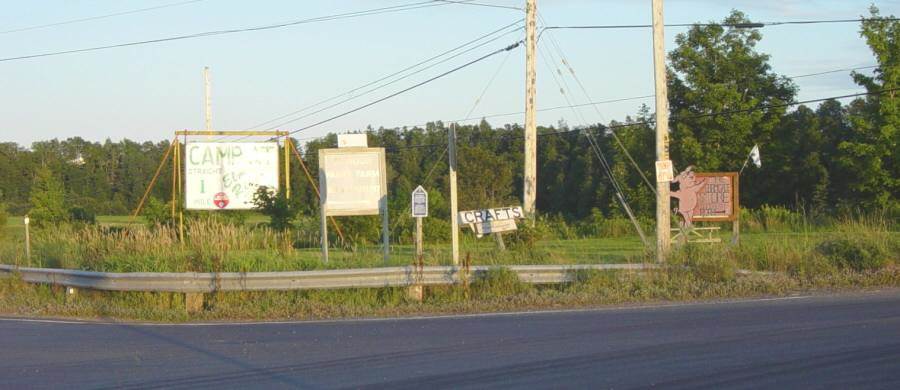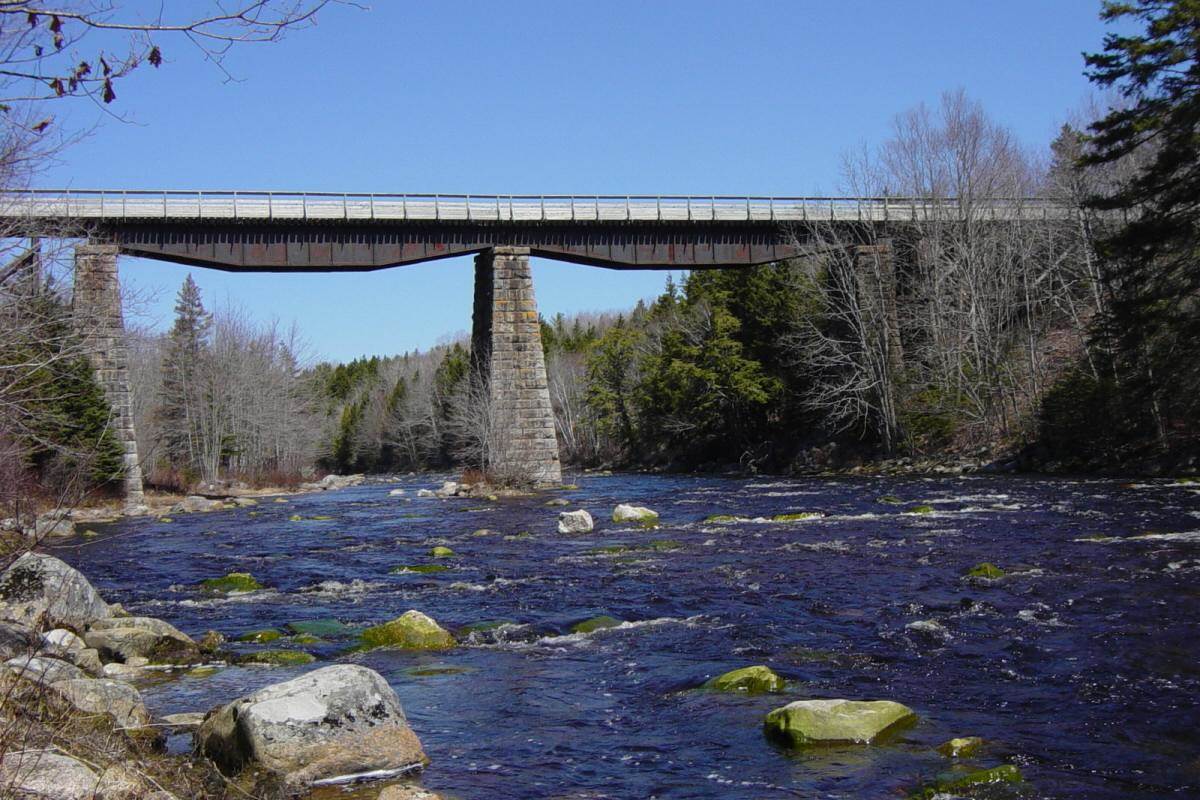
Military Engineers Centennial 2003
Trans Canada Trail Foundation
Gold River Bridge
Gold River Lunenburg County Nova Scotia
Located on the Gold River, between Croft Road and Beech Hill Road
Project
Gold River Bridge, Gold River, Nova Scotia
Type of project:
Restoration for recreational use,
113 m railway bridge and trestle
Work completed: August 2001
By: 143 Airfield Engineering Flight, Bridgewater, NS
Note: Completed in just three days
Thanks to:
Municipality of Chester
Nova Scotia Sport and Recreation Commission
Trans Canada Trail Foundation
Centennial 2003 corporate partners
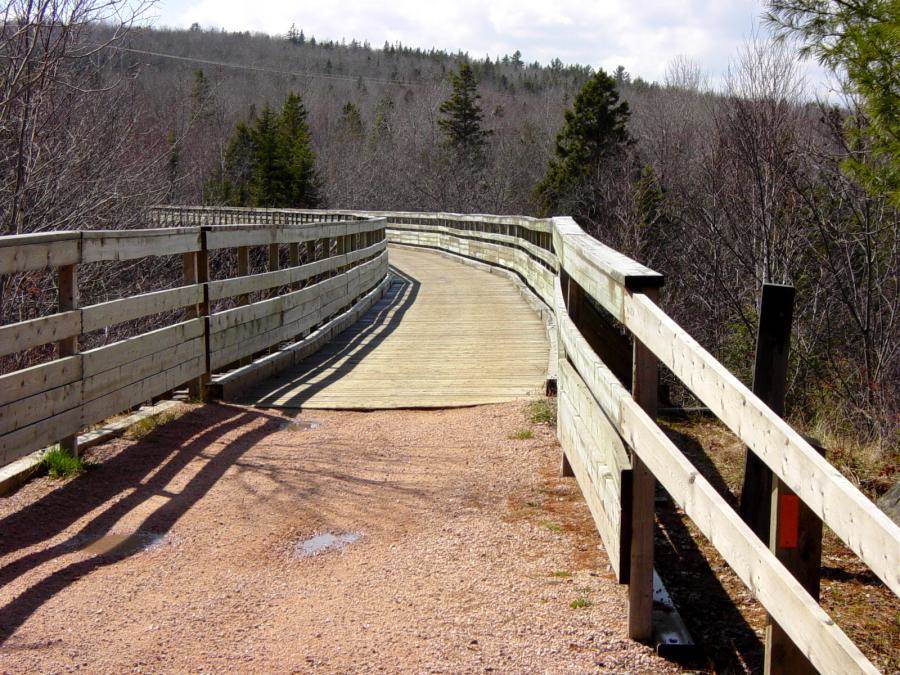
Gold River Bridge, with new deck and handrail built in August 2001
by military engineers of 143 Airfield Engineering Flight, Bridgewater.
Photographed on 29 April 2005
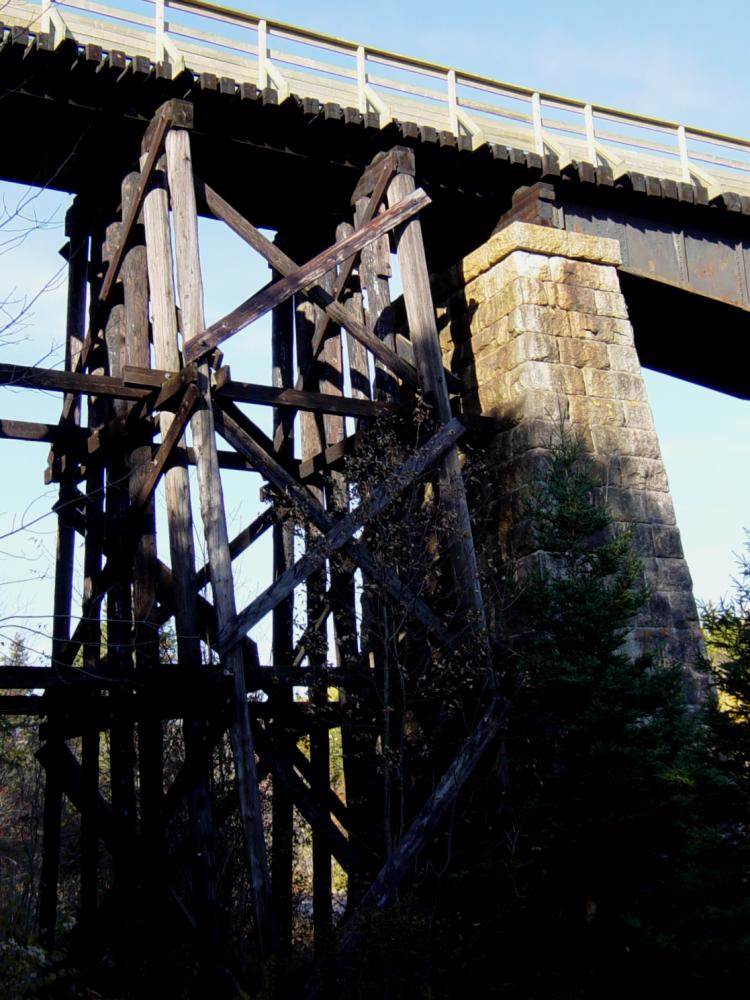
Photographed on 31 October 2002
The last train crossed this bridge on 19 September 1991.
It was a long, heavy train, powered by six CNR diesel-electric locomotives.
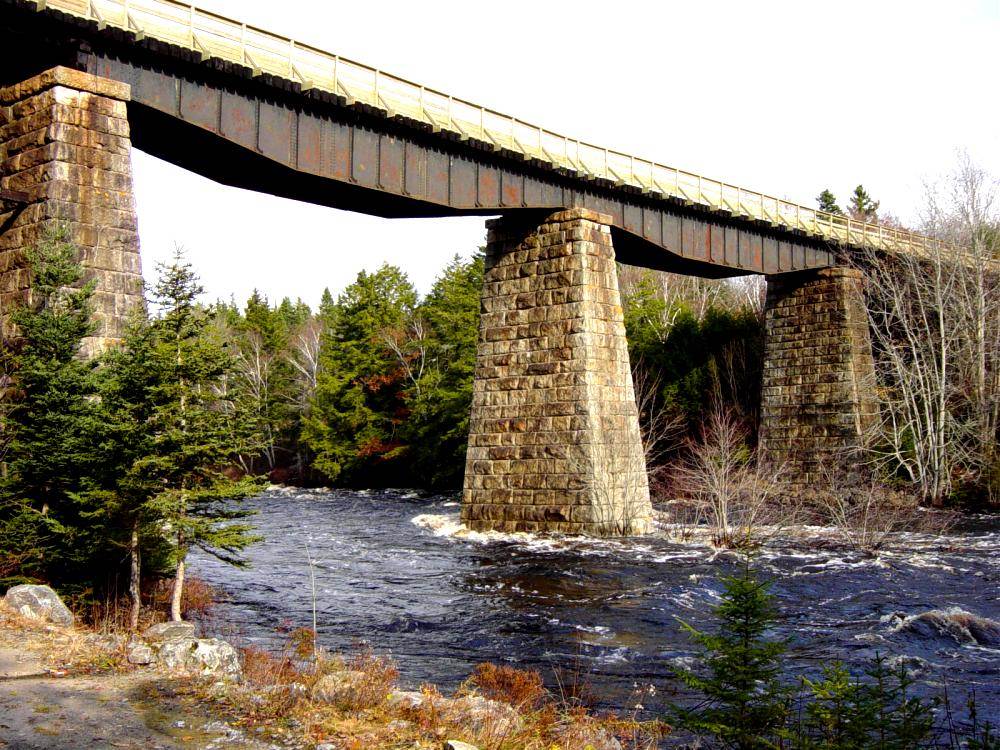
This bridge was built about 1905 by the Halifax & South Western Railway,
a subsidiary of the Canadian Northern Railway controlled by the legendary Mackenzie and Mann.
Photographed on 15 November 2002
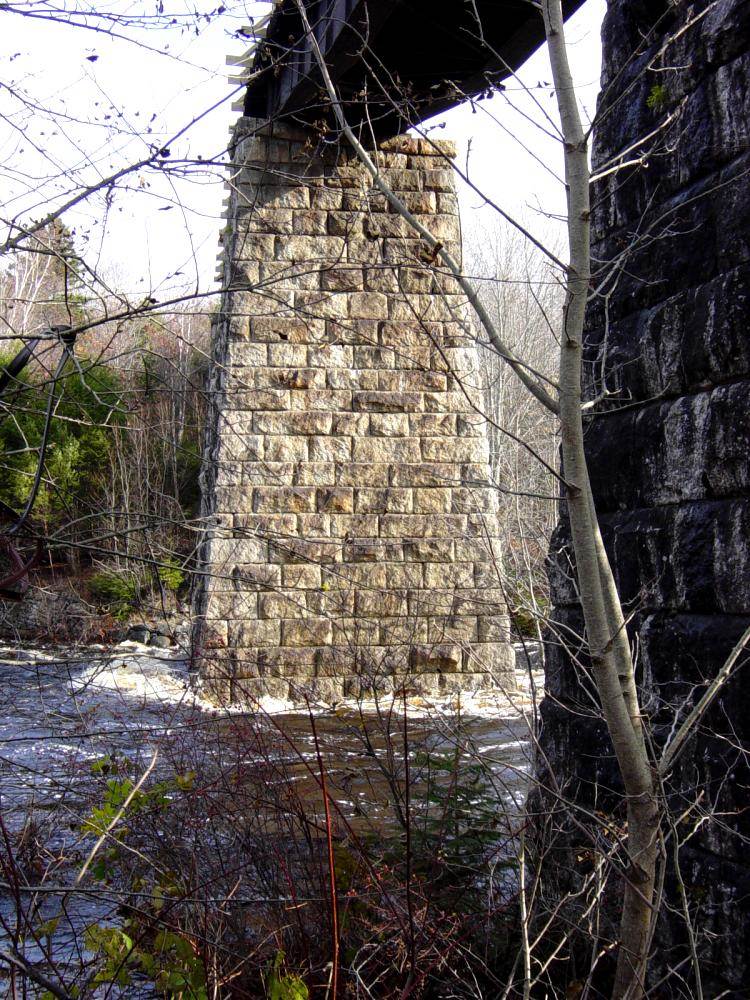
Photographed on 15 November 2002
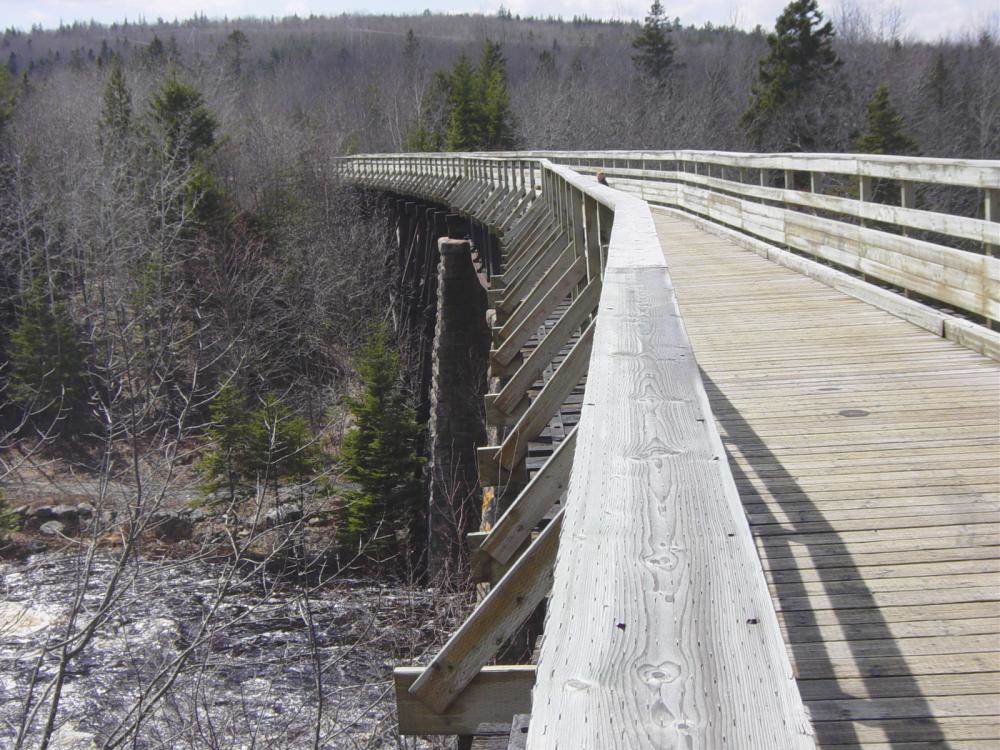
Photographed on 29 April 2005
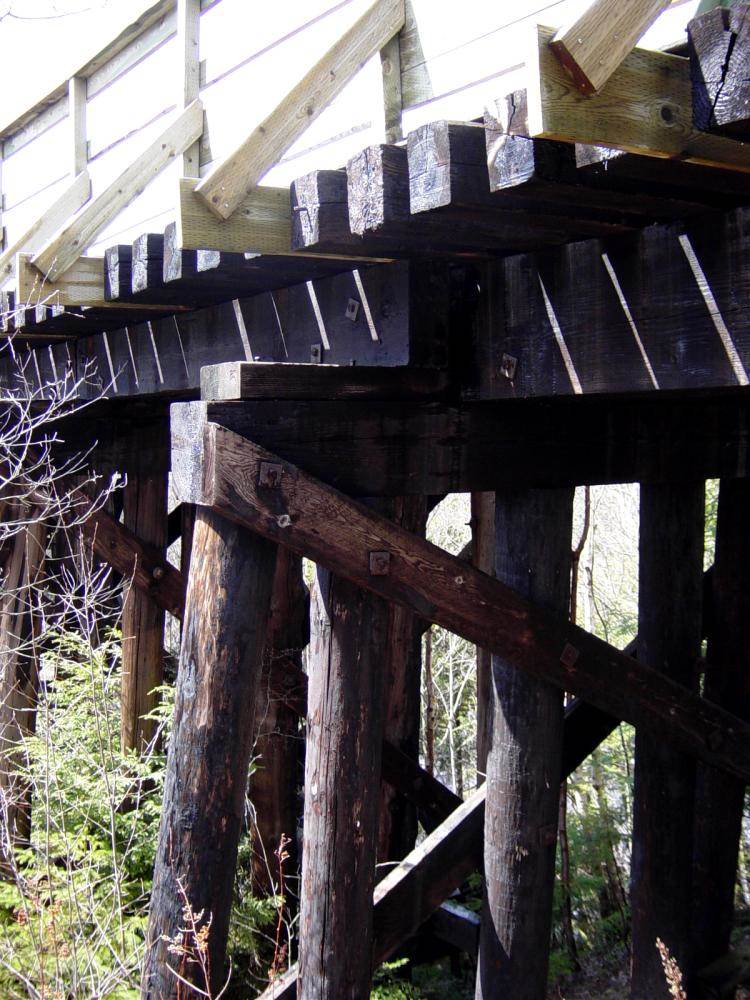
Photographed on 29 April 2005
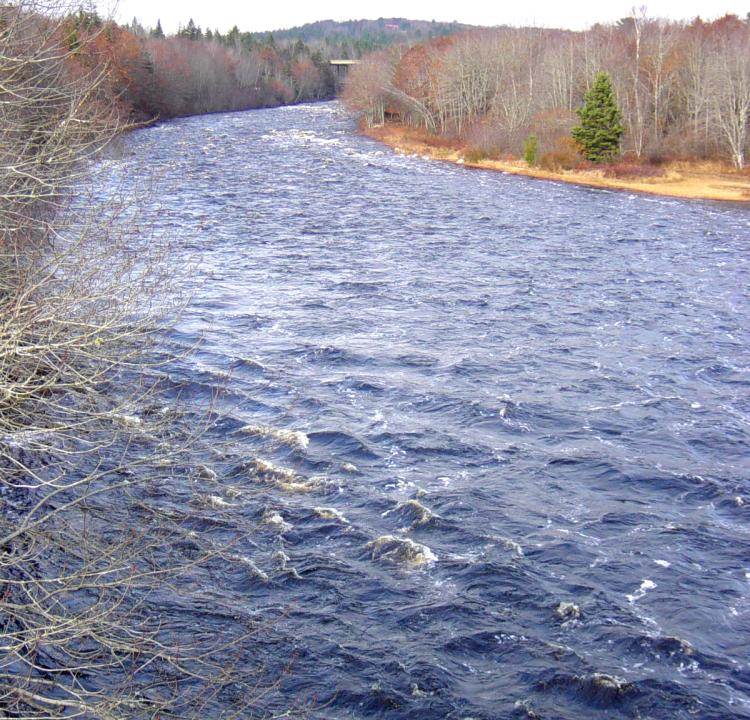
The Gold River looking upstream – the railway bridge can be seen in the distance.
Photographed on 15 November 2002

Photographed on 17 April 2008
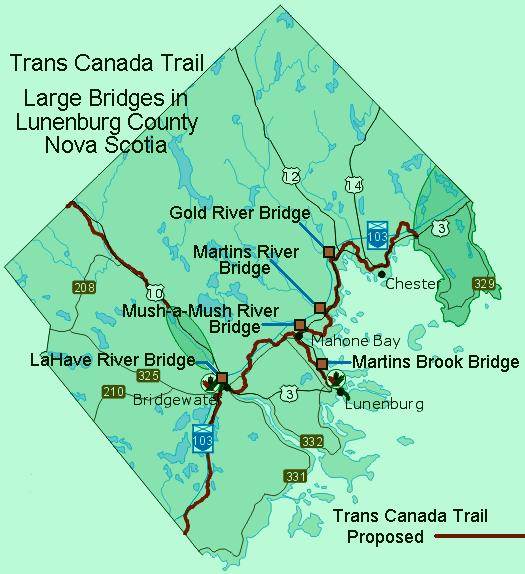
Map showing large bridges on Trans Canada Trail in Lunenburg County.
Also see: Military Engineers: Alderney Landing Pavilion
Also see: Military Engineers: Martins River Bridge
Also see: Halifax and Southwestern Railway by Wikipedia
Canadian Military Engineers 2003 Bridges for Canada
Bridges Renovated in Nova Scotia Under the Program:
• Celtic Crossing, Inverness, Inverness County
• Ghost Beach Bridge, Troy, Inverness County
• Gold River Bridge, Gold River, Lunenburg County
• Guysborough County Bridges, Guysborough County
• Haliburton Gut Bridge, Pictou, Pictou County
• Inverness County Bridges, Cape Breton Trail, Inverness County
• Martins Brook Bridge, Martins Brook, Lunenburg County
• Martins River Bridge, Martins River, Lunenburg County
• Mush-A-Mush Bridge, Mahone Bay, Lunenburg County
• River John Bridge, River John Village, Pictou County
• Rocky Run Bridge, Lawrencetown, Halifax Regional Municipality
• Tatamagouche Bridges, Tatamagouche, Colchester County
Canadian Military Engineers 2003
Bridges for Canada
Military Engineers Alderney Landing Pavilion, Dartmouth
https://ns1763.ca/hfxrm/alderneylanding.html
Bridges for Canada Trans Canada Trail
http://www.tctrail.ca/index.php?section_id=74&lang=en
Trans Canada Trail Report 2005
http://www.tctrail.ca/docs/2005trailreport-EN.pdf
What could be a more perfect partnership than Canada’s Military Engineers
and the Trans Canada Trail? With their centenary coming up in 2003, Canada’s
Military Engineers were seeking a bold project to commemorate their first hundred
years. For a corps whose mission includes conjuring up structures capable of
supporting an army, the idea of building bridges to conquer nature’s obstacles
was a natural. A partnership with the Trans Canada Trail provided an ideal
project – CME 2003: Bridges for Canada.
A three-year cooperative effort that began in 2000, the program was aimed
at helping communities along the Trans Canada Trail construct and restore bridges.
Not only would it benefit all Canadians, but also it would provide practical field
training for military engineers, engineering students and cadets. Over thirty bridges
have been built,one of which is now the longest pedestrian bridge in Canada.
Many were restoration projects: in some cases, abandoned railway bridges
transformed into safe and solid Trail structures.
Each local project began with the Military Engineers surveying the terrain and
determining the type of work to be done. Then local community Trail builders,
working with the Trans Canada Trail Foundation, set about raising the funds for
materials and equipment. The Canadian Military Engineers have indeed marked
their centenary in spectacular fashion. The Bridges for Canada project has made
a monumental contribution to the advancement of the Trail, leaving a legacy that
will endure for years…
Long Term Trans Canada Trail Concept in Nova Scotia
http://www.halifaxurbangreenway.org/maps/tct_concept_ns.JPG
On 25 April 2002 the National Launch of the
Centennial of Canadian Military Engineers 2003
took place at 14 Airfield Engineering Squadron
(14 AES) located in Bridgewater, Nova Scotia.
It marked the beginning of two years of
nation-wide celebrations and commemorations
29 April 2002 through 29 April 2004…
National Launch of the Centennial of Canadian Military Engineers 2003
http://www.cme-2003-gmc.org/stories/comm19_e.htm
The Centennial of Canadian Military Engineers — Bridges for Canada
http://www.cme-2003-gmc.org/bridges_e/about_e.htm
CME 2003 The Centennial of Canadian Military Engineers
http://www.cme-2003-gmc.org/herit/arch_e.htm
The Canadian Military Engineer Centennial Website was shut down in April 2004.
The following forwarding link is displayed in the
empty website:
“For further information on the Canadian Military Engineers and the Centennial”
please go to:
Canadian Engineers Military Museum
http://www.cmemuseum.ca/index_e/index_e.htm
The Centennial of Canadian Military Engineers — Map of Nova Scotia
http://cme-2003-gmc.org/bridges/NS_Map_e.shtml
Martins River Bridge
http://cmea-agmc.ca/Communiques/02.07.MartinsRiver_e.pdf
The Centennial of Canadian Military Engineers — Martins River Bridge
http://www.cme-2003-gmc.org/herit/Martins_river_e.htm
The Centennial of Canadian Military Engineers — Ghost Beach Bridge
http://www.cme-2003-gmc.org/herit/Ghost_Beach_Bridge_e.htm
The Centennial of Canadian Military Engineers — Challenging a Ghost
http://www.cme-2003-gmc.org/herit/ghost.pdf
No. 2 Construction Battalion
http://cmea-agmc.ca/history_Pictou_e.asp
The Centennial of Canadian Military Engineers — No. 2 Construction Batallion
http://www.cme-2003-gmc.org/herit/de05_e.htm
The Centennial of Canadian Military Engineers — British Commonwealth Air Training Plan
http://www.cme-2003-gmc.org/herit/BC_Air_Training_e.htm
The Centennial of Canadian Military Engineers — A Cape Breton Fortress
http://www.cme-2003-gmc.org/herit/nb02_e.htm
“…the British captured the fortress in 1758 during the
Seven Years War
after a seven week siege by 16,000 troops supported by 150 ships…”
The Centennial of Canadian Military Engineers — Halifax: First Home of the Engineers
http://www.cme-2003-gmc.org/herit/Halifax_e.htm
Canada’s First Military Flight
On the 23 July 1909, Mr. J.A.D. McCurdy and F.W. Baldwin … began to assemble
two aircraft delivered by rail from Braddock (sic, should be Baddeck), Nova Scotia…
On 2 Aug 1909, Baldwin and McCurdy made four successful take-offs and landings…
http://mypage.uniserve.ca/%7Eecho2/Don.htm#Flight
The Centennial of Canadian Military Engineers — Engineers Fly First
http://www.cme-2003-gmc.org/herit/nb01_e.htm

